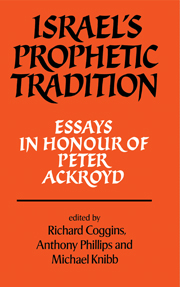Book contents
- Frontmatter
- Contents
- Preface
- Biographical note
- Abbreviations
- Note
- Prophecy in the ancient Near East
- The origins of prophecy in Israel
- Three classical prophets: Amos, Hosea and Micah
- The Isaiah tradition
- An alternative prophetic tradition?
- Visionary experience in Jeremiah
- The Ezekiel tradition: prophecy in a time of crisis
- The prophets of the restoration
- Prophecy and the emergence of the Jewish apocalypses
- Prophecy and wisdom
- Prophecy and the cult
- Prophecy and law
- A change of emphasis in the study of the prophets
- Martin Buber and the interpretation of the prophets
- Index of Biblical References
Prophecy and law
Published online by Cambridge University Press: 09 January 2010
- Frontmatter
- Contents
- Preface
- Biographical note
- Abbreviations
- Note
- Prophecy in the ancient Near East
- The origins of prophecy in Israel
- Three classical prophets: Amos, Hosea and Micah
- The Isaiah tradition
- An alternative prophetic tradition?
- Visionary experience in Jeremiah
- The Ezekiel tradition: prophecy in a time of crisis
- The prophets of the restoration
- Prophecy and the emergence of the Jewish apocalypses
- Prophecy and wisdom
- Prophecy and the cult
- Prophecy and law
- A change of emphasis in the study of the prophets
- Martin Buber and the interpretation of the prophets
- Index of Biblical References
Summary
As late as 1965, in his monograph Prophecy and Covenant, Clements held that central to the preaching of the canonical prophets was the concept of the Sinai covenant. Their unique contribution was to have reactivated the idea of the covenant, which had fallen into neglect. Indeed, Clements went so far as to assert that, without the prior fact of the covenant, the prophets would be unintelligible to us (p. 126). Clements, of course, recognised that the actual term for covenant (bērlt) was only found twice in the eighth-century prophets, in Hos. 6:7 and 8:1, but he argued that to elect someone must lead to some kind of special relationship between him who elects and him who is elected, in which the obligations of the latter are set out. The use of the term ‘covenant’ to describe such a relationship was ‘only of secondary importance’ (p. 54).
But a decade later, in the wake of Perlitt (1969), Clements, in his second monograph, Prophecy and Tradition (1975 a), accepted that the covenant theology only gradually emerged to reach its classical expression in the Deuteronomic literature. The attempt to see the prophet as fulfilling the office of covenant mediator based on Deut. 18:15ff must be abandoned, for it was the Deuteronomists who interpreted the prophets as preachers of tōrāh and spokesmen of the covenant between Yahweh and Israel. Further, reliance on Mendenhall's thesis (1954) relating the covenant to the Hittite suzerainty treaties, allegedly reflected in the prophetic curses and lawsuit oracles, must also be given up.
- Type
- Chapter
- Information
- Israel's Prophetic TraditionEssays in Honour of Peter R. Ackroyd, pp. 217 - 232Publisher: Cambridge University PressPrint publication year: 1982
- 1
- Cited by



